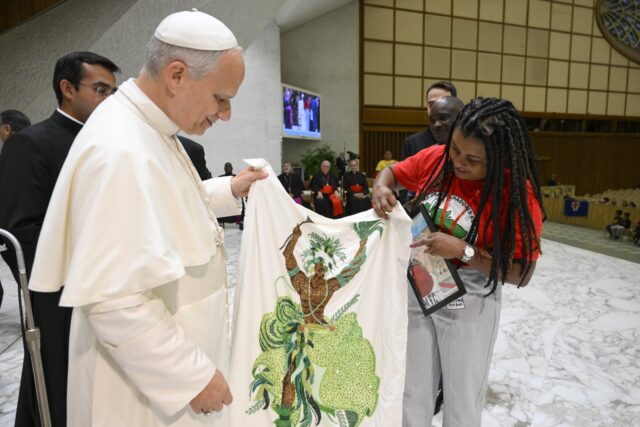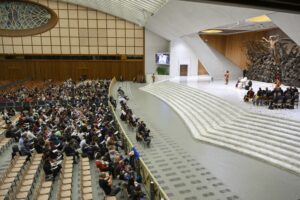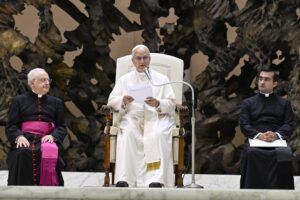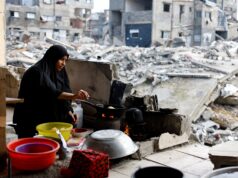
VATICAN CITY — The current abuse of vulnerable migrants is not the legitimate exercise of national sovereignty, Pope Leo XIV said, but rather it represents a serious crime being committed or tolerated by the government.
“Ever more inhuman measures are being adopted — even celebrated politically — that treat these ‘undesirables’ as if they were garbage and not human beings,” he said without mentioning any specific country during an address to so-called popular movements meeting at the Vatican Oct. 23.
“States have the right and the duty to protect their borders, but this should be balanced by the moral obligation to provide refuge,” he said.
For Christians, the pope said, God is love, and he “creates us and calls us to live as brothers and sisters.”
The theme of protecting the rights and dignity of the world’s immigrants was just one issue the pope addressed in a major speech that laid out some of the “new” social ills the church must focus on, such as: the deadly opioid crisis in the United States; online gambling; consumeristic lifestyles fueled by social media; so-called “conflict minerals”; and the poor being given easy access to new technologies while their fundamental needs of food, shelter and work are cut off or ignored.
The gathering in the Paul VI Audience Hall was part of the Jubilee of Popular Movements and the Fifth World Meeting of Popular Movements taking place in Rome Oct. 21-24. The popular movements include those that organize informal workers who collect and recycle trash, gather people who live in the informal settlements on the outskirts of cities, rally citizens to promote care of the environment, assist subsistence farmers and rescue migrants at sea.
Pope Leo greeted the participants and assured them that, like his predecessor Pope Francis, he believed “housing, work and land are sacred rights, it is worthwhile to fight for them, and I would like you to hear me say ‘I am here,’ ‘I am with you!'”
He reiterated that he chose the name Leo because of Pope Leo XIII’s landmark encyclical, “Rerum Novarum.” Latin for “Of New Things,” the 1891 document addressed the new social and economic challenges posed by the Industrial Revolution, particularly its impact on labor and workers’ rights.
Too often, Pope Leo XIV said, when society looks at the “new things” of the day, it looks at “what’s new” for the privileged, the powerful and the financially secure, like “autonomous vehicles, high-end mobile phones, cryptocurrencies and other such things.”
“From the peripheries, however, things appear differently,” he said.

“Is asking for housing, work and land, including food for the excluded, a ‘new thing’?” he asked. These basic, fundamental needs are “so current” that they merit “an entire chapter in Christian social thought on the excluded in today’s world.”
In fact, he said, Pope Leo XIII “did not concentrate on industrial technology or on new sources of energy, but rather on the situation of workers,” the poor and the oppressed.
“For the first time and with absolute clarity, a pope said that the daily struggle for survival and for social justice were of fundamental importance for the church,” he said.
In his five-page speech, the pope sought to look at the “new things” happening on “the periphery,” that is, “the problems that strike the excluded” and marginalized of today.
Notably, in today’s world, many old injustices continue, he said.
Progress must always be “managed through an ethic of responsibility, overcoming the risk of idolizing profit, and putting the human person and their integral development at the center,” he said, especially by including marginalized communities “in a collective and united effort to invert the dehumanizing tendencies of social injustices.”
“We should ensure that the ‘what’s new’ be managed in an appropriate way,” he said. “The question should not remain only in the hands of the political, scientific or academic elites, but rather should involve all of us.”
“Reversing the course that continues dramatically excluding millions of people who remain on the margins,” he said, is “a central point in the debate on the ‘new things.'”

Today, he said, “exclusion is the new face of social injustice.”
However, there is a surprising paradox, he said. “The lack of land, food, housing and decent work coexists with access to the new technologies.”
“Cell phones, social networks and even artificial intelligence are in the pockets of millions of persons, including the poor,” he said, but more fundamental needs must not be neglected.
Pope Leo blamed this “systemic arbitrariness” on “bad management” that “generates and increases inequalities with the pretext of progress.” When promoting human dignity is not the focus, then “the system fails also in justice.”
Some “new things” today, such as climate change, have a more devastating impact on the poor, the pope said.
But there is also “the new thing” of the pharmaceutical industry, he said.
While advances in medicine represent “great progress for some,” he said, “a cult of physical well-being is being promoted, almost an idolatry of the body.”
Any mentality that reduces “the mystery of pain” to something totally inhuman can lead to a dependence on pain medications, he said, “the sale of which obviously goes to increasing the earnings of the same pharmaceutical companies.”
“This also leads to dependence on opioids, as has been devastating, particularly in the United States. For example, fentanyl, the drug of death, is the second most common cause of death among the poor in that country,” he said.
“The spread of new synthetic drugs, ever more lethal, is not only a crime involving the trafficking of drugs but really has to do with the production of pharmaceuticals and their profit, lacking a global ethic,” he added.
Another aspect of the “new things” that hurts the marginalized, he said, is the lifestyle of “unbridled consumerism and a totally unrealizable level of economic success” being constantly promoted, especially on social media.
Dependency on digital gambling, whose “platforms are designed to create compulsive dependence and generate addictive habits,” is another new problem, he said.
The development of new technologies for computing and telecommunication also has a disproportionate effect on the poor because it depends on minerals — like coltan and lithium — often found in poor countries, he said.
The extraction of these minerals “depends on paramilitary violence, child labor and the displacement of populations,” he said.
Nations and corporations competing to extract the “white gold” of lithium, for example, threaten the sovereignty and stability of poor states, he said, “to the point that some contractors and politicians boast of promoting coups and other forms of political destabilization.”
“And, finally, I would like to accent the theme of security,” the pope said. “With the abuse of vulnerable migrants, we are witnessing, not the legitimate exercise of national sovereignty, but rather grave crimes committed or tolerated by the state.”
“At the same time, I am encouraged to see how the popular movements, the organizations of civil society and the church are addressing these new forms of dehumanization, constantly testifying that whoever is in need is our neighbor, our brother and our sister,” he said. “This makes you champions of humanity, witnesses to justice, poets of solidarity.”
The services that popular movements provide must be animated by love, he said. “In fact, when cooperatives and projects are formed to feed the hungry, give shelter to the homeless, rescue the shipwrecked, provide daycare, create jobs, access land and build houses, remember that we are not serving an ideology but truly living the Gospel.”
“The church must be with you: a poor church for the poor, a church that reaches out, a church that runs risks, a church that is courageous, prophetic and joyful!” Pope Leo said.











